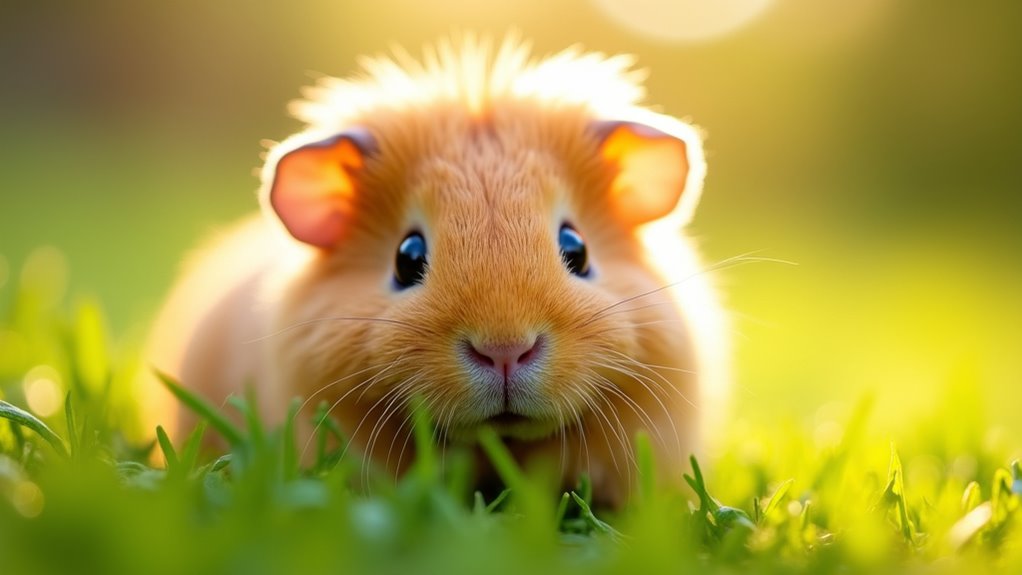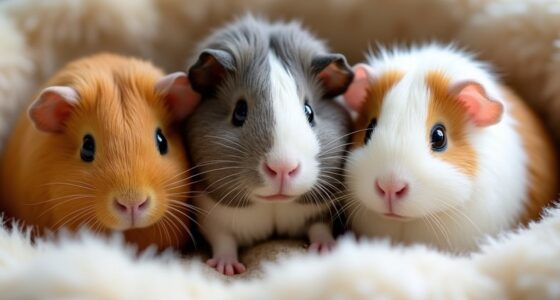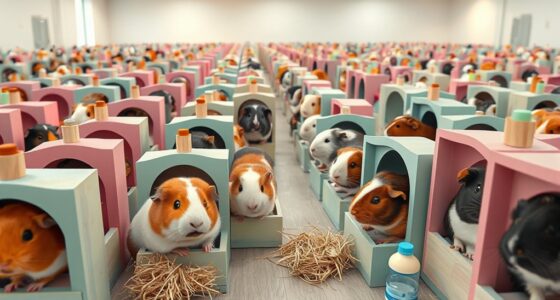Understanding your guinea pig’s sounds helps you know how they feel and what they need. Wheeks often mean excitement or hunger, with loud ones indicating urgency and softer ones showing happiness. Purring usually signals contentment, but sharp or loud purrs might mean discomfort. Chirps and squeaks are less common but can show curiosity, excitement, or annoyance. Paying attention to these clues and body language guides your care. Keep exploring to learn more about their intriguing communication style.
Key Takeaways
- Wheeks often indicate excitement, hunger, or seeking attention; their tone and frequency help determine the specific need.
- Purring generally signals contentment and relaxation, but loud or aggressive purring may suggest discomfort or agitation.
- Chirps are rare and may reflect excitement or curiosity, especially during exploration or playful behavior.
- Squeaks, high-pitched and short, can mean curiosity, annoyance, or discomfort, especially during handling or interaction.
- Understanding the context and body language accompanying sounds enhances communication and ensures proper care.

Guinea pigs communicate through a variety of sounds that can reveal their feelings and needs. Understanding these noises is key to building a stronger bond with your pet and ensuring they feel safe and comfortable. When you start paying close attention to your guinea pig’s sounds, you’ll notice patterns that help interpret guinea pig noises, making it easier to respond appropriately. Each sound carries a specific meaning, and recognizing these cues allows you to gauge their mood and address their needs effectively.
Understanding guinea pig sounds helps build trust and keeps your pet happy and comfortable.
Wheeks are among the most common sounds you’ll hear. Usually, they indicate excitement or anticipation, especially when your guinea pig expects food or playtime. A loud, persistent wheek suggests urgency—perhaps they’re hungry or want your attention. If their wheeks are softer and more frequent, it might mean they’re simply happy or seeking companionship. Conversely, a sudden, sharp wheek could signal distress or discomfort, prompting you to check on them to ensure everything’s okay. Interpreting guinea pig noises like wheeks helps you respond promptly, making sure your pet feels secure and loved. Additionally, understanding the context of their wheeks can help you determine their overall well-being, especially if they are frequently making this sound in unfamiliar situations.
Purring is another interesting sound, often misunderstood. Unlike cats, guinea pig purring typically signifies contentment. If your guinea pig emits a gentle, steady purr while being petted or resting, it’s a positive sign they’re relaxed and happy. However, a loud, aggressive purr might indicate discomfort or agitation. Pay attention to their body language along with the sound—if they’re tense or trying to move away, it’s best to give them some space. By interpreting guinea pig noises accurately, you can tell when they’re truly enjoying your company or if they need a break. Recognizing different types of purring can also help you identify subtle signs of stress before they escalate.
Chirps and squeaks are also important in guinea pig communication. Chirping, a rare sound, often puzzles owners because it’s unusual. When your guinea pig chirps, it may be a sign of excitement or a natural vocalization during certain activities like exploring. Squeaks tend to be high-pitched and short, usually indicating curiosity or mild annoyance. For example, if they squeak at you while you handle them, they might want to be put down or are signaling discomfort. Recognizing these subtle cues helps you interpret guinea pig noises more accurately, ensuring you respond in ways that keep your pet happy and stress-free. Properly interpreting these sounds can also prevent misunderstandings that might lead to unnecessary handling or frustration.
In essence, becoming familiar with your guinea pig’s sounds and their meanings enhances your guinea pig communication skills. Interpreting guinea pig noises isn’t just about understanding their language—it’s about creating a trusting relationship where your pet feels understood and safe. Paying attention to sound patterns and their context can greatly improve your ability to meet their needs. This understanding is supported by research on animal communication, which emphasizes the importance of body language and vocal cues in fostering positive interactions. By listening closely and observing their body language along with their sounds, you’ll be better equipped to meet their needs and enjoy a harmonious companionship. Developing this understanding can also improve your overall care practices, leading to a happier and healthier pet.
Frequently Asked Questions
Can Guinea Pig Sounds Indicate Health Issues?
You might notice your guinea pig making unusual sounds, which can indicate health issues. If their noises change, it could be related to their dietary needs or discomfort. Make sure they have proper cage enrichment to reduce stress. Pay attention to signs like persistent wheeks, silence, or abnormal chirps, as these can signal health problems. Regular check-ups and observing their sounds help keep your guinea pig healthy and happy.
Do Different Guinea Pigs Have Unique Vocal Signatures?
Imagine each guinea pig’s voice like a unique musical instrument, playing its own tune. Yes, guinea pigs have individual vocal signatures that reflect their personalities and communication styles. Just like humans have distinct voices, your guinea pig’s wheeks and chirps vary. Recognizing these differences helps you understand their mood and needs better. Over time, you’ll notice how each guinea pig’s sounds reveal their unique communication style, strengthening your bond.
How Can I Encourage My Guinea Pig to Vocalize More?
If you want your guinea pig to vocalize more, try engaging in training techniques that encourage communication. Spend quality time talking softly, offering treats during vocal moments, and maintaining a calm environment. Consistent vocal training helps your guinea pig associate your voice with positive experiences, making them more likely to respond vocally. Patience and gentle encouragement are key to fostering a more expressive and communicative pet.
Are There Specific Sounds for Guinea Pig Happiness?
Imagine your guinea pig’s playful noises as a secret handshake of happiness. When they chirp softly or make gentle purring sounds, it’s their way of showing joy and contentment. These communication cues signal they feel safe and loved. You’ll notice a happy guinea pig often wiggles, makes gentle squeaks, or purrs softly—clear signs of their happiness. Recognizing these sounds helps strengthen your bond and keeps your pet feeling secure.
Do Guinea Pig Sounds Change With Age or Environment?
As you observe your guinea pig, you’ll notice that age-related vocal changes occur; younger ones may squeak more, while seniors might produce softer sounds. Environmental influences also shape their noises—loud surroundings can cause more frequent chirps or squeals, while a calm space encourages gentle purring. You’ll see their sounds evolve over time, reflecting both aging and environmental factors, helping you better understand their mood and wellbeing.
Conclusion
Now that you’ve learned to decode guinea pig sounds, you’ll be better equipped to understand what your furry friend is telling you. Whether it’s a happy wheek or a curious chirp, each sound reveals a piece of their world. Remember, communication is a two-way street—pay attention and respond with love. Once you get the hang of it, you’ll see that understanding your guinea pig is easier than you might think. It’s all about reading between the lines!










